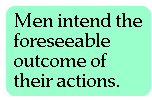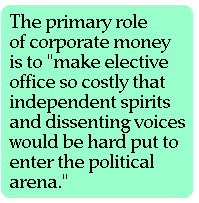 because the Democracy chose to tie them up. Here
defections, there deadlock. And there is, Karp shows, nothing
to explain it other than the party's decision to destroy its
president.
because the Democracy chose to tie them up. Here
defections, there deadlock. And there is, Karp shows, nothing
to explain it other than the party's decision to destroy its
president.
"'Any day is a good day to fight for
liberty'," by
Ronald N. Neff, part three
www.thornwalker.com/ditch/indispensable_02b.htm
Reprint
rights
Our Walter Karp table
of contents
TOC for Neff's article
The Carter debacle, continued
Karp was ever on the watch for hypocrisy from congressional figures. "I am not going to allow people to go to bed hungry for an austerity program ... no way," he quotes O'Neill in reference to the 1980 Carter budget — O'Neill, "who lifted not a finger to remove six million poor households from the tax rolls" during the previous year's savaging of Carter's 1979 budget and tax "reform" program. (LUS, pp. 94- 95)
Karp relates over and over again how the Democracy failed
to pass measures Carter supported, measures usually tied up
only  because the Democracy chose to tie them up. Here
defections, there deadlock. And there is, Karp shows, nothing
to explain it other than the party's decision to destroy its
president.
because the Democracy chose to tie them up. Here
defections, there deadlock. And there is, Karp shows, nothing
to explain it other than the party's decision to destroy its
president.
Men intend the foreseeable outcome of their actions. What outcome, seeing that party managers would not manage their party, was possible other than that the president should emerge beaten, timid, weak, and ineffectual? And if that meant losing an election to regain control of the process of selecting the presidential nominee, it was a small price to pay.
Could such an undertaking be carried out in plain sight? Well, in what would the difficulty lie? Carter was surrounded by such as Brzezinski, "Reaction's secret agent," a man who could meet with the president as often as four times a day, yet hail his defeat in 1980 as "the welcome presage of 'a policy of assertive competition' with Russia" (LUS, p. 42) and who was rumored to be meeting secretly with an aide of Scoop Jackson. Jackson, as chairman of the Senate Armed Services Committee, had become the most implacable foe Carter faced in his foreign-policy (and energy-policy) objectives. (The two had parted ways when in 1976 they began to seek the same object — the presidency. During the Pennsylvania primary, Carter said that Jackson was being used by the party bosses, and it was in Pennsylvania that Jackson's candidacy collapsed.)
And then there was Vance. Both Rothbard and Karp recognized that he was Brzezinski's great rival in foreign affairs, but only Rothbard noticed that the man was also on the board of the New York Times. That affiliation suggests some implications for Vance's presumptive loyalty to his embattled president — implications that will become clearer when I talk about the press.
Finally, it has come out only fairly recently that Carter's vice president considered resigning from the administration in 1979, in an attempt to salvage his own political future. [7]
Carter was a weak president, says Karp, precisely because a
president without party backing can be nothing else. As a
great ideologue (Rothbard's compliment), Carter had been
able to enjoy public support when he masqueraded as a man
of the people. Within the first month of the Carter regime,
Byrd announced that he would not drum up votes for or
against Paul Warnke, Carter's choice for arms control
negotiator, but might himself vote against him. At once, there
was talk that Carter might "go public" with the nomination.
The House speaker replied quickly. "If Carter tried to go over
the head of Congress, says O'Neill, it will be 'the biggest
mistake Mr. Carter could  ever make.'" (LUS, p. 37)
Not even Richard Nixon had been so threatened by a
congressional leader.
ever make.'" (LUS, p. 37)
Not even Richard Nixon had been so threatened by a
congressional leader.
And Carter never did go public. At every turn, when he met with perfidy, he might have gone before the people who had elected him and attempted to enlist their support. Instead, he took blame for the failures himself, described them as character-building, and spoke of O'Neill as his friend.
Karp examines other enemies of Carter, as well, for these, after all, were the early years of the history of the New Right. He notes, for example, that one of its house organs, Conservative Digest, carried an article by George Meany in its first issue and that one of its first acts was to join forces with Jackson and Meany and various other "fuglemen of the Democratic establishment." They "urge Americans who loathe the old ruling Democratic oligarchy to wage war against its enemies." (LUS, p. 37, italics in original)
Karp also chronicles the rise of the PACs. The primary role of corporate money is to "make elective office so costly that independent spirits and dissenting voices would be hard put to enter the political arena." (LUS, p. 45) It had been the Democratic Congress that altered election laws so that corporate bodies holding government contracts (i.e., almost all of them) would no longer be prohibited from setting up PACs. Even so, by 1975, there were only 139 corporate PACs, and by the 1976 election, only 433.
On April 5, House Democratic leaders hold an "unusual meeting" with the chief executives of ten giant American corporations. The ten are "deans" of the Business Roundtable, a five-year-old organization composed of the heads of 200 of the largest corporations in America, who would like, if granted immunity, to lobby personally against a number of Carter administration proposals. The discreet little conclave is later described as a "get-acquainted meeting" by Congressional Quarterly, a summit conference between Boston-Austin and Business Roundtable that "sets the tone for the Roundtable's participation in legislative deliberations: an articulate advocacy of a limited agenda by top business leaders...." What Speaker O'Neill and Majority Leader Wright have done this April day is exactly what the Reaction requires: They have invited the heads of the largest corporations in America to walk into the offices of congressmen, make free of Capitol Hill and direct all the influence they can muster to kill off any legislation they do not like; a "limited agenda" which will leave the "outsider" President without a single democratic reform to his credit and which will alter, in due course, the political atmosphere of the country. (LUS, pp. 49- 50)
And of course, Karp highlights for us the ever-present collusion between the two parties: [8]
Republicans would call the Panama Canal treaty issue "the best political issue that could be handed to a political party in recent history." [9] How did the Democrats handle it? Byrd gave the treaty's opponents a precious gift of time and said on September 13, 1977, that he would not let the treaty reach the floor because there were too many weeks of hearings required. The floor would stand virtually empty for almost two whole months in 1977, and when the treaty did reach the floor on February 21, 1978, it "consumed more Senate time than any foreign policy issue since the Treaty of Versailles." (LUS, p. 62)
In other collusion, when the National Energy Plan, the centerpiece of Carter's legislative proposals, finally reached the conference stage, a new deadlock machine was created:
Normally, each House appoints as conferees only supporters of its bill, but this conference ... is founded on quite different principles.... The Speaker has called deregulation "totally unacceptable," but of the twenty-six legislators he names to the conference, thirteen favor deregulation. Jackson adamantly opposes deregulation, but the Senate's conferees are none other than the eighteen exquisitely divided members of his committee [seven of them Republicans].... And what does this forty-four man, flesh-and-blood machine produce with remarkable clockwork efficiency? Ironclad, unbreakable deadlock, day after day, week after week, month after month.... [In particular, the Jackson 18] will remain 9-9 until next August 18, when they all agree to — deregulation, just what Carter opposed. (LUS, pp. 71-72)
The president had planned an overseas trip to last from November 22 to December 3. Congressional big shots persuaded him to cancel it so that he might work more closely with the energy conference. Then Congress recessed from November 18 to November 28.
To the next part: "Another indispensable enemy."
Posted June 17, 2002
© 2002 by WTM Enterprises. All rights reserved.
What do you think of Neff's analysis of Karp so far? If you'd like to see your brief comments posted on the site, please respond here.
Notice to visitors who came straight to this document from off site: You are deep in The Last Ditch. You should check out our home page and table of contents.